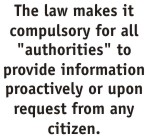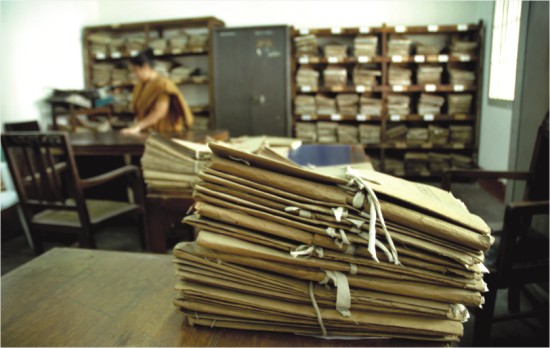
Inside
|
Freedom to Know Shaheen Anam explores the Right to Information Act and its implications for Bangladesh
The parliament passed the much-awaited bill on Right to Information (RTI) on May 29, paving the way for people to get information from public authority as a right. By enactment of the RTI law, the present government has made an important statement in support of transparency and accountability of all public functions and authority. The UN General Assembly in 1948 declared freedom of information as a fundamental human right and the touchstone for all rights to which the United Nations is consecrated. Right to information creates legal entitlement for people to seek information, and includes the duty of the public function bodies, government or non-government, to make information public and easily available. It enables citizen to seek information from duty holders and make duty holders responsible to disseminate important information proactively, even if it is not asked for. Provisions in the constitution Article 7 declares that all powers in the republic belong to the people. Article 11 declares the republic as democracy, and assure human rights and freedom. Therefore, people's right to all information cannot be barred in any way. Article 39 articulates freedom of thought, conscience, speech, and the freedom of press. If real democracy is in practice, then the absence of any particular provision for this right should create no bar in accessing information. How our neighbours did it India (2005) Pakistan (2002) It does not override the Official Secrecy Act and applies only to federal records and not the provincial and local records. National security is defined as everything and anything so that all records may be exempted from public access. There is also no time frame for disposal of matters, giving scope for harassment of information seekers. The Bangladesh context In 2005 Manusher Jonno Foundation (MJF), representing a large network of non-governmental organisations, invited the Commonwealth Human Rights Initiative (CHRI) to provide technical assistance in terms of capacity building, awareness raising, and creating better understanding of the benefits of RTI. Meanwhile, the demand for RTI started to be made by different groups such as media, research groups, academia, NGOs, etc. A process of knowledge building started through developing various communications materials, popular theatre, and songs on RTI, and commissioning of research. Many non-governmental organisations and networks become actively involved in this process. It is important to note that, unlike India, the demand for the law did not start at the grass-roots level. The demand was raised by civil society groups, realising that if Bangladesh were to have any chance of improving governance, curbing corruption and establishing accountability and transparency in public institutions, then a law on RTI would be key tool to do so. Civil society groups did not only raise the demand, but went one step ahead to help the government draft the law, and lobbied actively for its legislation. Led by the RTI Forum (loose coalition of 80 organisations and individuals) a law was drafted, reviewed, and critiqued by experts and submitted to the Information Ministry in 2007. The ministry finalised the draft and finally it signed as an ordinance by the president in October 2008. After the general elections of December 2008 the RTI Forum lobbied with parliamentarians for the enactment of the RTI law. The law minister, information minister, and several MP's were met individually to press for its enactment. The RTI Forum also lobbied with the expert group and the special committee which was set up to review ordinances passed during the care taker regime. Finally, on March 29, the bill was enacted in parliament as Right to Information Act, 2009. What's on the table Substantive documents such as rules, regulations, laws, manuals, and information related to license, permit, grant allocation, etc have been brought under category of information, which is supposed to be disclosed proactively. In line with the demand of civil society, supremacy of the law over existing laws such as the Special Powers Act has been ensured. The list of exemptions, however, is too long, and civil society groups remain critical of it.
The three-member Information Commission responsible for investigating complaints will be headed by a chief information commissioner, and will have at least one female member. The commission, however, has not been given adequate independence in regard to decide about the staff capacity and number and its budget. The government holds the final authority of approving these. The rank and salary of the chief information commissioner and the other information commissioners will also be decided by the government. These limitations may cause barriers for the commission to function independently Bangladesh now stands at the threshold of immense possibility to strengthen democracy and establish a transparent and participatory system of governance. The RTI law will further strengthen democracy and give people the opportunity to participate in public affairs. It will also promote transparency, a culture of openness, and create opportunities for more dialogue and discussions on critical national issues. The RTI Law will enable the general population to hold elected representatives accountable for their promises and pledges and government functionaries accountable as per government rules of business. Effective implementation of the RTI law will pave the way for institutionalising a democratic and open governance system, and assist to fulfill the present government's promise of a corruption-free government. It will provide the key to good governance and make participatory democracy meaningful. It will also assist in implementing people-centred development that is based on equitable growth. From the livelihoods perspective, examples abound on how correct information received at the right time has changed the lives of people. Programs to provide much-needed information on health, agriculture, and human rights to people at the local level by public institutions have resulted in improvement in the livelihoods of the poor. Farmers claim that correct and timely information improved their yield, poultry farmers averted a major crisis, and women have been able to claim rightful dowry and benefits. Information on government entitlements, safety net programs, allocation to local government are what people want to know and profit from in a Right to Information regimen. By using RTI, the general population can demand information as a right on issues such as the budget allocation for the upazila or the amount of funds allocated and spent in constructing roads, culverts, schools, hospitals, etc. The present law is not restricted only to public and government institutions. Private organisations and NGOs -- all those dealing with public funds or who provide services to the public should be held accountable and abide by the same standards of public disclosure. Looking into the future It is imperative that a strong enforcement mechanism is set in place. Without further delay, the search committee should be constituted and the Information Commission set up. In India, the Office of the Information Commission is a prestigious and highly regarded constitutional body which reports to the president of the country.
In the RTI Act 2009, the roles and responsibilities of the Information Commission has been well defined. Most importantly, it should be allowed to work independently and without interference. It should not only arbitrate when information is denied, but by itself be an advocate for RTI. Lastly, we all have to make an effort, at individual and institution level, to get out of the culture of secrecy. Open and timely information has the potential to stop corruption, improve governance, and ensure accountability and transparency, thereby bringing about positive changes in the lives of millions. With so much at stake, we can ill afford to withhold information and go back to a culture of secrecy and denial of information. Shaheen Anam is Executive Director, Manusher Jonno Foundation. |


 An attempt has been made to simplify the procedure of receiving information. Information request, for instance, can be made in white paper or through email instead of the prescribed format. Sensitivity has been shown in case of people with disability by assuring information providing in a disable-friendly manner. Although the stipulated time for giving information is 20 days, in case of special circumstances, such as arrest, death etc, information should be provided within 24 hours.
An attempt has been made to simplify the procedure of receiving information. Information request, for instance, can be made in white paper or through email instead of the prescribed format. Sensitivity has been shown in case of people with disability by assuring information providing in a disable-friendly manner. Although the stipulated time for giving information is 20 days, in case of special circumstances, such as arrest, death etc, information should be provided within 24 hours. 